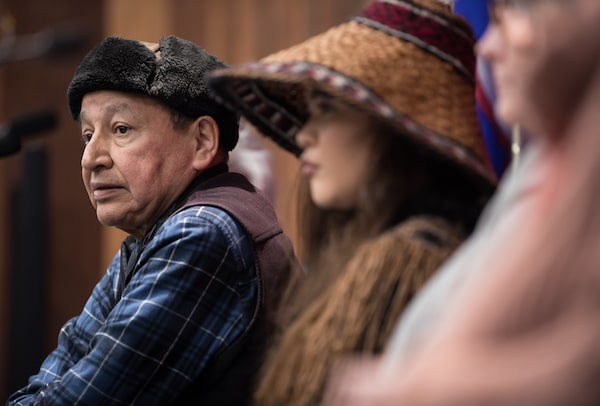
Grand Chief Stewart Phillip, President of the Union of B.C. Indian Chiefs, discusses the response from the chair of the RCMP's Civilian Review and Complaints Commission regarding the RCMP exclusion zone in the Wet'suwet'en territory in Vancouver on Feb. 20, 2020.DARRYL DYCK/The Canadian Press
B.C.'s civil liberties association says a report by the civilian RCMP watchdog validates concerns about the policing of continuing Wet’suwet’en protests in northern B.C. over the construction of a natural gas pipeline.
On Thursday, the association released a letter from the chair of the Civilian Review and Complaints Commission for the RCMP regarding police conduct to ward off protests against pipeline construction in Wet’suwet’en territory.
Complaints commission chairperson Michelaine Lahaie was responding to allegations from the B.C. Civil Liberties Association that Mounties unlawfully restricted access to a remote logging road before enforcing an injunction this month on behalf of Coastal GasLink, which is developing the pipeline.
In particular, the association filed statements on behalf of eight Wet’suwet’en members and supporters who say they were turned away from the area when trying to deliver supplies, give legal support or visit pipeline opponents at a camp along the road.
Ms. Lahaie does not directly comment on the details of the current B.C. dispute, but she says concerns are of “significant public interest” and issues raised have been addressed in a report on the RCMP’s policing of anti-shale gas protests in New Brunswick in 2013.
Ms. Lahaie says her organization’s report on that dispute, which involved Indigenous-led protests, was submitted to the RCMP in March, 2019, and she is awaiting the police force’s response to the document.
Harsha Walia, executive director of the civil liberties association, told a news conference in Vancouver that it is “incredibly disturbing” that the Mounties have been sitting on the document for about a year.
“There has been much talk lately about the rule of law. I want to make clear here that the RCMP operations and RCMP blockades in Wet’suwet’en territory are an affront to the rule of law.”
Ms. Lahaie says she made 37 findings and 12 recommendations on the policing of protests in her report and that guidance from that report may be applied to the current situation in northern B.C.
Among other findings, she said the Mounties had “reasonable grounds” to arrest people in the anti-shale gas protests and “the force used was necessary and proportional in the circumstances.”
However, she said she was concerned about the lack of legal authority to conduct stop checks for gathering information on people in vehicles, echoing a concern now in B.C. about RCMP asking all drivers and passengers for names and identification as a mandatory condition for entering and exiting checkpoints.
She said random stops “were found to be inconsistent with the Charter rights of the vehicle occupants.”
RCMP spokesperson Catherine Fortin said Thursday the volume and complexity of material raised by the commissioner’s report make it difficult to provide a time line for a response to the report.
“Despite other challenges and pressures, the completion of the analysis of the interim report has been prioritized so that the Commissioner will be able to provide her response as soon as possible,” she said in a statement Thursday, referring to RCMP Commissioner Brenda Lucki.
Ms. Fortin acknowledged the delay in responding to the interim report.
"Efforts are currently underway to address this imbalance,” she said.
Mary Ellen Turpel-Lafond, director of the Indian Residential School History and Dialogue Centre at the University of British Columbia and also a UBC law professor, told the news conference that complaints commissioner’s letter raises some pertinent questions.
“It is extremely important and a matter of national interest that policing practice be clarified so that the rights of First Nations people are respected,” she said.
“It is extremely important that there be clarity about what are buffer zones, what are exclusion zones, whether or not a broad-based police effort around First Nations territories is justified."
We have a weekly Western Canada newsletter written by our B.C. and Alberta bureau chiefs, providing a comprehensive package of the news you need to know about the region and its place in the issues facing Canada. Sign up today.
 Ian Bailey
Ian Bailey